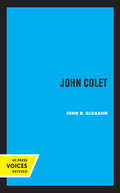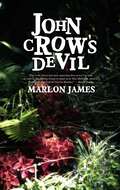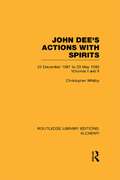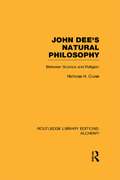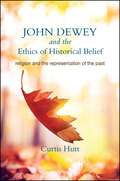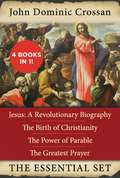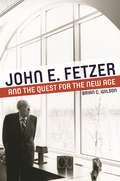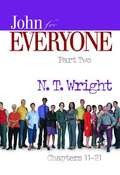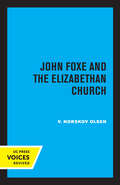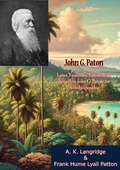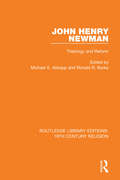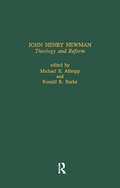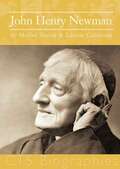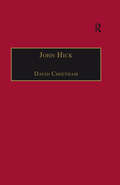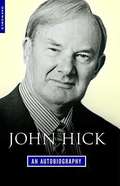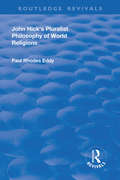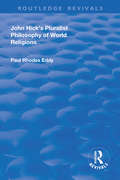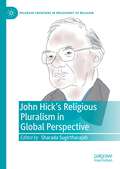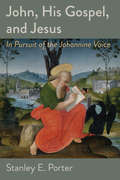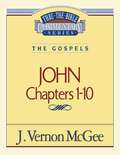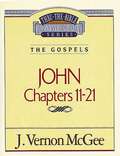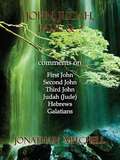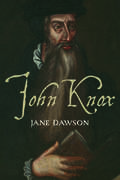- Table View
- List View
John Colet
by John B. GleasonThis title is part of UC Press's Voices Revived program, which commemorates University of California Press’s mission to seek out and cultivate the brightest minds and give them voice, reach, and impact. Drawing on a backlist dating to 1893, Voices Revived makes high-quality, peer-reviewed scholarship accessible once again using print-on-demand technology. This title was originally published in 1989.
John Crow's Devil: From The Man Booker Prize-winning Author Of A Brief History Of Seven Killings
by Marlon JamesThe long-awaited paperback reissue of the acclaimed Jamaican author's debut novel. The incredible debut novel from 2015 Man Booker Prize winner Marlon James Finalist for the Los Angeles Times Book Prize and the Commonwealth Writers' Prize "A powerful first novel...Writing with assurance and control, James uses his small-town drama to suggest the larger anguish of a postcolonial society struggling for its own identity." --New York Times Book Review, Editors' Choice "A Brief History of Seven Killings might have won the Booker, and Black Leopard, Red Wolf might be the next Game of Thrones, but if you're looking for an entry point into the much-lauded, highly raucous mind of Marlon James, his 2005 debut could actually be the place to start: it's just as powerful and intricately written as James's later works, but it's quite a bit shorter, and easier to carry around with you everywhere you go, something you will surely want to do." --Literary Hub, 10 Debut Novels Nobody Reads Anymore--But Should "Elements coalesce in a Jamaican stew spicier than jerk chicken. First novelist James moves effortlessly between lyrical patois and trenchant observations...It's 150-proof literary rum guaranteed to intoxicate and enchant. Highly recommended." --Library Journal, Starred review "Set in James's native Jamaica, this dynamic, vernacular debut sings of the fierce battle between two flawed preachers...an exciting read." --Publishers Weekly "A mesmerizing treatise on the nature of good and evil, faith and madness, guilt and forgiveness, eloquently captured in a microcosm of society." --Booklist "John Crow's Devil engages the political legacy of Frantz Fanon without sacrificing the power of fiction...There's a temptation to compare John Crow's Devil to novels by Toni Morrison or Earl Lovelace, among others, and there are certainly similarities to those works in this one. There is even an echo of Faulkner in the meticulous, multi-vocal rendering of conflicts entrenched in village life. But more important than any comparison is that James' debut is very much its own book, and stands as tall on its own as it would with any other volume beside it." --Small Spiral Notebook This stunning debut novel tells the story of a biblical struggle in a remote Jamaican village in 1957. With language as taut as classic works by Cormac McCarthy, and a richness reminiscent of early Toni Morrison, Marlon James reveals his unique narrative command that will firmly establish his place as one of today's freshest, most talented young writers. In the village of Gibbeah--where certain women fly and certain men protect secrets with their lives--magic coexists with religion, and good and evil are never as they seem. In this town, a battle is fought between two men of God. The story begins when a drunkard named Hector Bligh (the "Rum Preacher") is dragged from his pulpit by a man calling himself "Apostle" York. Handsome and brash, York demands a fire-and-brimstone church, but sets in motion a phenomenal and deadly struggle for the soul of Gibbeah itself. John Crow's Devil is a novel about religious mania, redemption, sexual obsession, and the eternal struggle inside all of us between the righteous and the wicked.
John Dee's Actions with Spirits: 22 December 1581 to 23 May 1583 (Routledge Library Editions: Alchemy)
by Christopher WhitbyThis was originally a two volume set which is now bound as one. Here is presented an investigation of the nature of the earliest extant records of the supposed communication with angels and spirits of John Dee (1527-1608) with the assistance of his two mediums or 'scryers', Barnabas Saul and Edward Kelly. Volume 2 of this work is a transcription of the records in Dee's hand contained in Sloane MS 3188, which has been transcribed only once before, by Elias Ashmole in 1672. Volume 1 is an introduction and thorough commentary to the text which is primarily explaining its many obscurities. The author describes the physical state of the manuscript and its history then continues with a biography of Dee and his scryers and some background to Renaissance occult philosophy. Further chapters address the arguments that the manuscript represents a conscious fraud or a cryptographical exercise and describe the magical system and instruments evolved during the communications or 'Actions'. The last, fascinating chapter examines Dee's motives for believing so strongly in the truth of the Actions and suggests that a principal motive was the conviction, not held by Dee alone, that a new age was about to dawn upon earth.
John Dee's Conversations with Angels
by Deborah E. HarknessJohn Dee's angel conversations have been an enigmatic facet of Elizabethan England's most famous natural philosopher's life and work. Professor Harkness contextualizes Dee's angel conversations within the natural philosophical, religious and social contexts of his time philosophy, and the apocalypse, and argues that they represent a continuing development of John Dee's earlier concerns and interests. These conversations include discussions of the natural world, the practice of natural philosophy, and the apocalypse.
John Dee's Natural Philosophy: Between Science and Religion (Routledge Library Editions: Alchemy)
by Nicholas CluleeThis is the definitive study of John Dee and his intellectual career. Originally published in 1988, this interpretation is far more detailed than any that came before and is an authoritative account for anyone interested in the history, literature and scientific developments of the Renaissance, or the occult. John Dee has fascinated successive generations. Mathematician, scientist, astrologer and magus at the court of Elizabeth I, he still provokes controversy. To some he is the genius whose contributions to navigation made possible the feats of Elizabethan explorers and colonists, to others an alchemist and charlatan. Thoroughly examining Dee’s natural philosophy, this book provides a balanced evaluation of his place, and the role of the occult, in sixteenth-century intellectual history. It brings together insights from a study of Dee’s writings, the available biographical material, and his sources as reflected in his extensive library and, more importantly, numerous surviving annotated volumes from it.
John Dewey and the Ethics of Historical Belief: Religion and the Representation of the Past
by Curtis HuttJohn Dewey and the Ethics of Historical Belief addresses the ethics of the representation of the past with a focus on the justification of historical belief within religious and critical historiographical traditions. What makes a belief about the past justified? What makes one historical belief preferable to another? A great deal rides on how these questions are answered. History textbook wars take place across the globe, from California to India. Cultural heritage protection is politicized and historical research is commonly deployed in support of partisan agendas.This book explores not only John Dewey's relatively unknown contribution to this topic, but also the leading alternatives to his approach. Author Curtis Hutt focuses attention on the debate among those most influenced by Dewey's thought, including Richard Rorty, Richard Bernstein, James Kloppenberg, Wayne Proudfoot, and Jeffrey Stout. He also reviews the seminal work of Van Harvey on the relationship between historians and religious believers. Dewey is cast as a vigorous opponent of those who argue that justified historical belief depends upon one's religious tradition. Strongly resisted is the idea that historical belief can be justified simply on account of acculturation. Instead, Dewey's view that beliefs are justified as a result of theorized historical inquiry is emphasized. In order to prevent moral blindness, the responsible historian and theologian alike are advised to attend to witnesses to the past that arise from outside of their own traditions.
The John Dominic Crossan Essential Set
by John Dominic CrossanThe eBook collection of four complete works by bestselling author and leading historical Jesus scholar John Dominic Crossan, including Jesus: A Revolutionary Biography, The Birth of Christianity, The Power of Parable, and The Greatest Prayer.
John E. Fetzer and the Quest for the New Age (Great Lakes Books Series)
by Brian C. WilsonJohn E. Fetzer and the Quest for the New Age follows the spiritual sojourn of John E. Fetzer, a Michigan business tycoon. Born in 1901 and living most of his life in Kalamazoo, Fetzer parlayed his first radio station into extensive holdings in broadcasting and other enterprises, leading to his sole ownership of the Detroit Tigers in 1961. By the time he died in 1991, Fetzer had been listed in Forbes magazine as one of the four hundred wealthiest people in America. And yet, business success was never enough for Fetzer—his deep spiritual yearnings led him from the Christianity of his youth to a restless exploration of metaphysical religions and movements ranging from Spiritualism, Theosophy, Freemasonry, UFOology, and parapsychology, all the way to the New Age as it blossomed in the 1980s. Author Brian C. Wilson demonstrates how Fetzer’s quest mirrored those of thousands of Americans who sought new ways of thinking and being in the ever-changing spiritual movements of the twentieth century. Over his lifetime, Fetzer's worldview continuously evolved, combining and recombining elements from dozens of traditions in a process he called "freedom of the spirit." Unlike most others who engaged in a similar process, Fetzer’s synthesis can be documented step by step using extensive archival materials, providing readers with a remarkably rich and detailed roadmap through metaphysical America. The book also documents how Fetzer’s wealth allowed him to institutionalize his spiritual vision into a thriving foundation—the Fetzer Institute—which was designed to carry his insights into the future in hopes that it would help catalyze a global spiritual transformation. John E. Fetzer and the Quest for the New Age offers a window into the rich and complex history of metaphysical religions in the Midwest and the United States at large. It will be read with interest by those wishing to learn more about this enigmatic Michigan figure, as well as those looking for an engaging introduction into America’s rapidly shifting spiritual landscape.
John for Everyone, Part 2: Chapters 11-21 (The New Testament for Everyone)
by N. T. WrightMaking use of his scholar's understanding, yet writing in an approachable and anecdotal style, Tom Wright manages to unravel the great complexity of the extraordinary Gospel of John. He describes it as "one of the great books in the literature of the world; and part of its greatness is the way it reveals its secrets not just to a high-flown leaning but to those who come to it with humility and hope." Wright's stimulating comments are combined with his own fresh and inviting translation of the Bible text.Tom Wright has undertaken a tremendous task: to provide guides to all the books of the New Testament, and to include in them his own translation of the entire text. Each short passage is followed by a highly readable discussion with background information, useful explanations and suggestions, and thoughts as to how the text can be relevant to our lives today. A glossary is included at the back of the book. The series is suitable for group study, personal study, or daily devotions.
John Foxe and the Elizabethan Church
by V. Norskov OlsenThis title is part of UC Press's Voices Revived program, which commemorates University of California Press’s mission to seek out and cultivate the brightest minds and give them voice, reach, and impact. Drawing on a backlist dating to 1893, Voices Revived makes high-quality, peer-reviewed scholarship accessible once again using print-on-demand technology. This title was originally published in 1973.
John G. Lake: His Life, His Sermons, His Boldness
by Kenneth Copeland PublicationsCollected sermons, poems, and writings of DR. John G. Lake. Well known healer and evangelist of the early 20th century.
John G. Paton: Later Years and Farewell: A Sequel to John G. Paton, an Autobiography
by A. K. Langridge Frank Hume Lyall PattonJohn G. Paton: Later Years and Farewell is a heartfelt continuation of the life story of John G. Paton, the renowned Scottish missionary to the New Hebrides (modern-day Vanuatu). Co-authored by A. K. Langridge and Frank Hume Lyall Patton, this sequel builds upon Paton’s earlier autobiography, focusing on the final chapter of his extraordinary life of service, faith, and dedication to the mission field.The book provides an in-depth look at Paton’s later missionary efforts, documenting his relentless advocacy for the people of the New Hebrides and his tireless work to secure support from churches and governments. Despite advancing age, Paton continued to travel extensively, sharing his experiences, raising funds, and inspiring others to join the cause of spreading the Gospel. Langridge and Patton offer a vivid portrait of a man whose faith and passion for mission work remained undiminished, even in his twilight years.Alongside Paton’s public ministry, the book reflects on his personal joys and struggles, including the challenges of health, family, and the complexities of working across cultural divides. The narrative celebrates the lasting impact of Paton’s mission, highlighting the transformation of the New Hebrides communities from hostility toward Christianity to embracing the faith.The authors provide a fitting farewell, capturing the legacy of Paton’s lifelong commitment to his calling and the profound influence he left on both the island communities and the global missionary movement. John G. Paton: Later Years and Farewell is not only a tribute to a remarkable life but also an inspiring reminder of the power of faith, perseverance, and service.For readers of Christian biography, missionary history, or those following the life of John G. Paton, this book offers a moving and enriching conclusion to the story of one of the 19th century’s most influential missionaries.
John Henry Newman: Theology and Reform (Routledge Library Editions: 19th Century Religion #2)
by Michael E. Allsopp Ronald R. BurkeThis collection of papers, first published in 1992, grew out of a concern for the perduring nature of the thought of John Henry Cardinal Newman. Although Cardinal Newman died over one hundred years ago, his influence on today’s thinking is still strong. Newman put forward an ideal of society and life which has a recognizable relation to the lasting possibilities open to humankind. The editors and contributors of this volume have been brought together by a common interest in a man for whom the continual search for truth is paramount.
John Henry Newman: Theology and Reform (Routledge Library Editions: 19th Century Religion Ser. #2)
by Michael E. Allsopp Ronald R. BurkeThis collection of papers grew out of a concern of several at Creighton University for the perduring nature of the thought of John Henry Cardinal Newman. Although Cardinal Newman died some one hundred years ago, his influence on today’s thinking is still strong. Like Sir Thomas More with his Utopia, Newman put forward an ideal of society and life which has a recognizable relation to the lasting possibilities open to humankind. First published in 1992. Routledge is an imprint of Taylor & Francis, an informa company.
John Henry Newman: Apostle To The Doubtful (Cts Biographies Ser.)
by Meriol Trevor Leonie CaldecottEminent Victorian academic and thinker, Anglican clergyman and celebrated convert, caring pastor and writer, Catholic priest, and Cardinal - these are some of the signposts along John Henry Newmans celebrated journey. This biography reveals a compassionate man who was much more than a writer and polemicist. As a pastor, priest, and friend, he offered lasting counsel to many and lived out the demands of the gospel.
John Hick: A Critical Introduction and Reflection
by David CheethamJohn Hick is considered to be one of the greatest living philosophers of religion. Hick's philosophical journey has culminated in the grand proposal that we should see all the major world religions as equally valid responses to the same ultimate reality (the 'Real'). This book presents a critical introduction to John Hick's speculative theology and philosophy. The book begins where Hick began, with the problems of religious language, and ends where Hick is now, exploring the questions of religious plurality. Incorporating early aspects that Hick himself would now wish to qualify, as well as explanations that reflect Hick's present focus, Cheetham offers some speculative reflections of his own on key topics, highlighting Hick's influence on contemporary theology and philosophy of religion. All those studying the work of this great philosopher and theologian will find this new introduction offers an invaluable overview along with fresh critical insight.
John Hick: An Autobiography
by John HickFrom his early conversion to evangelical Christianity to his role as a conscientious objector in World War II and his move towards religious pluralism, this book will be core reading for many courses taught on John Hick around the country.
John Hick's Pluralist Philosophy of World Religions
by Paul Rhodes EddyThis title was first published in 2002. One of the most fascinating and controversial interpretations of religious diversity is 'religious pluralism.' According to John Hick's model of religious pluralism, all the world's great religions are equally valid ways of understanding and responding to the ultimate spiritual reality. This book offers an exposition of, and critical response to, John Hick's model. Introducing the various interpretations of religious diversity being discussed today, this book presents constructive suggestions as to how things could be further developed to offer a more accurate, less confusing presentation of the various options in theology of religions. The standard threefold typology of responses to religious diversity - exclusivism, inclusivism, and pluralism - are explained and defended. Hick's pluralist interpretation of religious diversity is traced, culminating in a critical assessment of Hick's pluralistic model and an up-to-date summary of a variety of critiques directed toward Hick's proposal.
John Hick's Pluralist Philosophy of World Religions
by Paul Rhodes EddyThis title was first published in 2002. One of the most fascinating and controversial interpretations of religious diversity is 'religious pluralism.' According to John Hick's model of religious pluralism, all the world's great religions are equally valid ways of understanding and responding to the ultimate spiritual reality. This book offers an exposition of, and critical response to, John Hick's model. Introducing the various interpretations of religious diversity being discussed today, this book presents constructive suggestions as to how things could be further developed to offer a more accurate, less confusing presentation of the various options in theology of religions. The standard threefold typology of responses to religious diversity - exclusivism, inclusivism, and pluralism - are explained and defended. Hick's pluralist interpretation of religious diversity is traced, culminating in a critical assessment of Hick's pluralistic model and an up-to-date summary of a variety of critiques directed toward Hick's proposal. Paul Rhodes Eddy concludes that Hick's present model is ultimately unsuccessful in retaining both of his long-cherished goals, a robust religious realism and a consistent religious pluralism, whilst overcoming the most difficult problem for the pluralist, the fact that the world's religions understand the divine in often contradictory ways.
John Hick's Religious Pluralism in Global Perspective (Palgrave Frontiers in Philosophy of Religion)
by Sharada SugirtharajahThis volume contains fresh scholarly contributions to mark the birth centenary of John Hick, the internationally well-known philosopher of religion, whose works continue to have significant global relevance in today’s religiously diverse and conflict-ridden world. His writings have reset the parameters of religious pluralism. Up till now, Hick’s religious pluralism has been mainly seen in relation to the Western context where Christianity is the predominant religion. This volume includes both Western and non-Western engagement with his thinking in contexts such as Japan, China, Korea, Nigeria, and India, where Christianity is a minority religion with little political power. Its distinctiveness lies in widening the debate on religious pluralism by bringing Hick’s pluralistic hypothesis into a constructive cross-cultural and interreligious conversation with scholars of Hinduism, Jainism, Daoism, Judaism, Christianity, Islam and African traditional religions. In doing so, this collection examines how Hick’s philosophy of religious pluralism has been received, appropriated and appraised by these scholars. It has been appreciated and critiqued in equal measure, and continues to impact on current thinking on religious pluralism. This volume makes a significant contribution to the debate initiated by Hick.
John, His Gospel, and Jesus: In Pursuit of the Johannine Voice
by Stanley E. PorterCaptures John's unique perspective and voice in the wider field of Jesus studies In this volume Stanley Porter tackles a variety of important and often highly contentious topics within the Gospel of John as a means of defining and capturing the distinctive Johannine voice. Subjects discussed include John in relation to competing Gospels, the public proclamation of Jesus in John, the sources of John's Gospel, John's prologue, the "I Am" sayings, the notion of truth, the Passover theme, and the ending of the book. Each chapter, besides surveying representative research, puts forward new and insightful proposals regarding the topics concerned. Porter does not shy away from matters that have often perplexed Johannine scholars, and he confronts some of the viewpoints that have led to confusion in the field. In exploring John's unique perspective and voice, Porter makes a significant contribution to the wider fields of Jesus studies and New Testament investigation.
John I: The Gospels (Thru the Bible #38)
by J. Vernon McgeeRadio messages from J. Vernon McGee delighted and enthralled listeners for years with simple, straightforward language and clear understanding of the Scripture. Now enjoy his personable, yet scholarly, style in a 60-volume set of commentaries that takes you from Genesis to Revelation with new understanding and insight. Each volume includes introductory sections, detailed outlines and a thorough, paragraph-by-paragraph discussion of the text. A great choice for pastors - and even better choice for the average Bible reader and student! Very affordable in a size that can go anywhere, it's available as a complete 60-volume series, in Old Testament or New Testament sets, or individually.
John I: John, Chapters 11-21 (Thru the Bible)
by Vernon McgeeRadio messages from J. Vernon McGee delighted and enthralled listeners for years with simple, straightforward language and clear understanding of the Scripture. Now enjoy his personable, yet scholarly, style in a 60-volume set of commentaries that takes you from Genesis to Revelation with new understanding and insight. Each volume includes introductory sections, detailed outlines and a thorough, paragraph-by-paragraph discussion of the text. A great choice for pastors - and even better choice for the average Bible reader and student! Very affordable in a size that can go anywhere, it's available as a complete 60-volume series, in Old Testament or New Testament sets, or individually.
John Judah Paul & ?
by Jonathan MitchellA VALUABLE COMPANION to your study and understanding a! the Scriptures, this collection unlocks every word, every verse and every paragraph to uncover the original thought and intent of God '5 Word. The interpretation and comments on the letters of J0hn Judah Paul and the letter to the Hebrews are based upon the New Testament translation by the author and roe-examines the essential messages of the New Covenant, the preeminence of Christ, the truth of love, the better promises. the freedom from bondage, and the God-gifted power of grace over law Drawing upon years of meticulous research of multiple texts and resources this work IS intended to shed new light based upon a correct understanding of the Greek texts Within the perspective of the local life situations and their first century contexts, and equally important, to serve as a catalyst for critical thinking regarding the impact of these letters upon our lives today. Inside you will find: * A word-based translation * Multiple renderings of the Greek texts * A historical-critical approach * Critical attention to the significance of the Greek verb tenses * Significance of optional case functions of nouns * A concise introduction to each letter * Alternate renderings parenthetically inserted in lightface * Multiple references to other New Testament letters and the tow gospels * Additional quotes cited from various commentators * Verses presented in bold face for easy reading For readers worldwide - pastors teachers students and study groups this extensive verse-by-verse commentary expresses the transformative power of the continuously active and luring word. About the Author JONATHAN MITCHELL IS a speaker teacher and translator of the Greek New Testament He is the author of THE NEW TESTAMENT, God's Message of Goodness Ease and Well-being Which Brings God's Grits of His Spin! His Life, His Grace, His Power. His Fairness. His Peace and His Love; and Peter, Paul and Jacob Comments on First Peter, Philippians, Colossians, First Thessalonians Second Thessalonians, First Timothy, Second Timothy, Titus, Jacob (James). He holds a master's degree in Anthropology from Northern Arizona University and resides With his family in Arizona.
John Knox
by Jane DawsonJane Dawson has written the definitive life of John Knox, a leader of the Protestant Reformation in sixteenth-century Scotland. Based in large part on previously unavailable sources, including the recently discovered papers of Knox's close friend and colleague Christopher Goodman, Dawson's biography challenges the traditionally held stereotype of this founder of the Presbyterian denomination as a strident and misogynist religious reformer whose influence rarely extended beyond Scotland. She maintains instead that John Knox relied heavily on the support of his "godly sisters" and conferred as well as argued with Mary, Queen of Scots. He was a proud member of the European community of Reformed Churches and deeply involved in the religious Reformations within England, Ireland, France, Switzerland, and the Holy Roman Empire. Casting a surprising new light on the public and private personas of a highly complex, difficult, and hugely compelling individual, Dawson's fascinating study offers a vivid, fully rounded portrait of this renowned Scottish preacher and prophet who had a seismic impact on religion and society.
